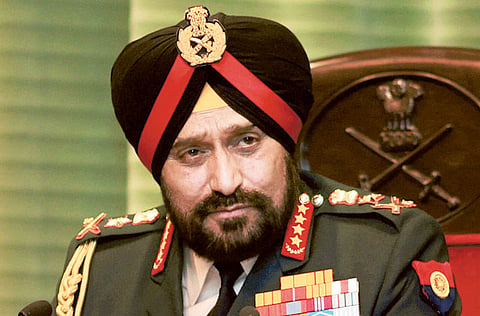India, Pakistan armies trade protests over deadly exchanges
Army chief says expects commanders to be aggressive

New Delhi: Indian and Pakistani commanders on Monday traded protests over recent deadly exchanges in disputed Kashmir as the chief of staff in New Delhi ordered an “aggressive” response to any fresh cross-border firing.
While foreign ministers of both sides have warned against escalating tensions, General Bikram Singh reiterated the sense of outrage within the Indian army’s ranks over the killing of two soldiers on January 8, one of whom was beheaded.
Pakistan denies its troops were to blame for any such incident. It says two of its soldiers were killed by Indian firing in the last eight days along the Line of Control, a de facto border where a ceasefire has been in place since 2003.
“We expect our commanders to be aggressive,” said Singh ahead of the talks along the LoC where one of his brigadiers lodged a protest at the decapitation.
“The orders are very clear: when provoked, I expect my unit commanders should fire back.”
Singh said the treatment of the Indian soldiers last week was “an unpardonable act” while adding that it should not lead to a breakdown in peace talks.
“We want the Pakistani army to hand over the head of the soldier as soon as possible,” he said at a news conference in New Delhi.
“We want to keep the dialogue process on and also explore the best ways to communicate with Pakistan, but the attacks must stop,” Singh added.
An army spokesman later confirmed that senior officers from both sides held talks at an undisclosed location along the LoC, lasting a mere 32 minutes.
“Brigadier Suchendra Kumar represented the Indian army team. We have lodged our protest with Pakistan,” army spokesman J. Dahiya told AFP.
The Pakistan military also said that it had lodged a “strong protest” over Indian ceasefire violations.
“During the flag meeting, Pakistan strongly rejected the Indian allegations that Pakistani troops resorted to unprovoked fire, attacked any Indian post or killed Indian soldiers,” the military said.
Singh said the attack which led to the beheading must have been planned well in advance and reiterated the claim that it was the work of the Pakistani army.
“These kind of operations require planning of at least 10 to 15 days. You have to observe the activities, arrange the logistics, firepower. You have to have a plan and practise that plan. No one would like to leave tell-tale signs,” he said.
“The clockwork precision, detailed planning and execution... is indicative of premeditated and pre-planned action of Pakistan.”
The family of the decapitated soldier, Lance Naik Hemraj, has gone on a hunger strike as part of a campaign to ensure that his head is returned.
“I want my husband’s complete body. He served the country and deserves respect,” his wife Dharmvati told the Hindi-language Zee TV news channel.
Kashmir, a Muslim-majority territory, is divided into Indian and Pakistani-administered sectors but is claimed in full by both sides.
It has been the cause of two of three wars between India and Pakistan since independence from Britain in 1947.
After a total break in ties after the 2008 Mumbai attacks, which India blamed on Pakistan-based militants, relations had been slowly improving. Recent talks had focused on opening up trade and offering more lenient visa regimes.
While deploring the “ghastly” January 8 attack, India’s Foreign Minister Salman Khurshid has said it must not trigger “an escalation” of tensions. His Pakistani counterpart Hina Rabbani Khar stressed her desire to normalise ties.
Sign up for the Daily Briefing
Get the latest news and updates straight to your inbox



